People Part I
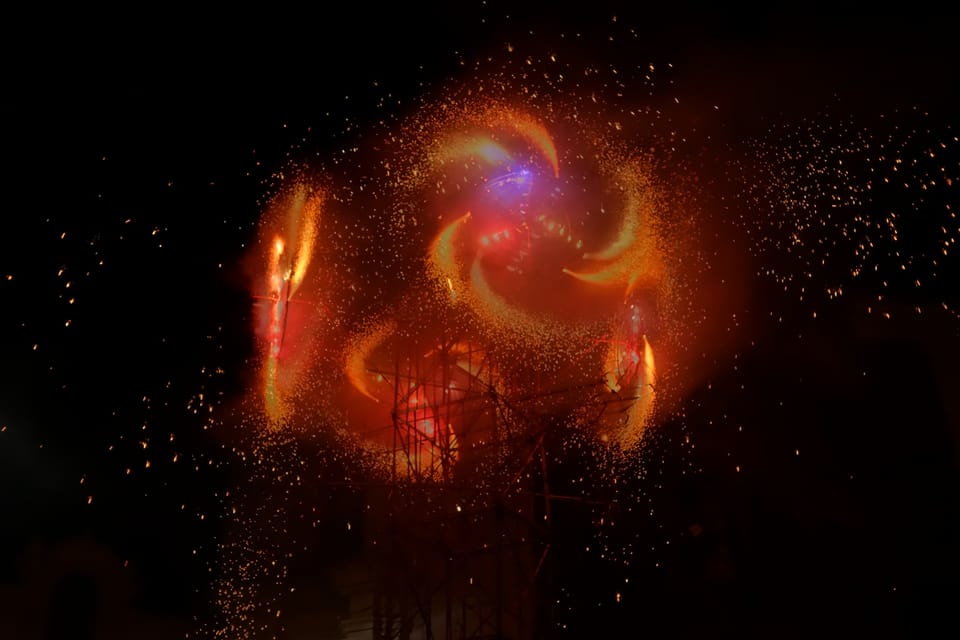
Biting off more than you can chew is not atypical in the lived experience of the casual adventurer, the standard cycle tourer (or tourist, you decide). And perhaps, considering the pace — which is slow — and elements-prone nature, it is not so unusual to feel the morass churning inside hours before crunch time. It’s a slow-moving, defiantly avoidable cock-up that’ll lead to a shivering night and an ice-dead morning. Even the bottle of garishly pink concentrated bike soap will turn slush-puppie. 70 grams of roasted cashews is a luxurious inflight snack, or a duffer’s poor nourishment after climbing over 4,850m with a liquid-generating internal system. Such is life. You could have stayed another day in Huancavelica, stayed for the city’s birthday celebrations, yet another fiesta in a long tradition of avoiding work to blow a trumpet. At least I witnessed the deranged tower of relayed Catherine wheels culminating in a perpendicularly-oriented cousin that consequently catapulted itself heavenward in a spiral of fizzing yellow light. A few Peruvian men attempted to stick their hands in the flame, intoxicated from a day full of knocking back shots of beer from the shared plastic cup of their cultural drinking circles, these ones amassed upon the rubble-strewn forecourt of a forelorn church coloured as an inverted flag of Peru with white bell towers flanking its blood red gates. Blessedly lesser-pissed companions steered them back to the shadows. No one was there to steer me one-eighty degrees the following morning when illness presented its progression on (yet another) littered verge.
Clearly I survived. So what’s this all about? Truth be told it’s a vain attempt to link more recent experiences with the stories I want to tell below. In a way it’s a long-winded excuse for the paucity of examples from Bolivia and Peru. How? You see, when I realised that there was no way I’d reach over the edge of the Andes and head down to warmer heights before day’s end I mentally settled on seeking the next campable spot and this turned out to be a farmstead. A host of characters tumbled in and out of a stone-walled chimney-topped building, a family with young children but also plenty of adults that could be related but may not be. The chimney was puffing and my fingers and toes were numb from the cold, the last light having just flickered over the mountain tops cradling this barren bowl. I asked if I could camp — that took some effort: my throat wasn’t playing ball. A response took its time. Apparently la dueña required consultation and she was busy whilst the men stood around doing the sum total of fuck all. The result was my being offered a rocky patch across the road to pitch the tent. That was it. Throughout that evening and the following morning I repeatedly heard “gringo” being referenced. The sum total of Peruvian and Bolivian hospitality in nutshell.
Boy am I a thankless jerk. Look, it’s not quite true. I’ll rebalance the record without cooking the books. However in general it has been the case that whilst in Chile and Argentina I expected nothing and received plenty, in Bolivia and Peru (thanks to the prior surprises) barely consciously I expected a little and received far less.
I also wrote some of what follows months and thousands of kilometres ago and would rather not discard it wholesale. I’m frugal like that.
And then Maria Ester put her phone on the table, opened to Google Maps, located to Scotland and asked, “And where is your home?” And right there and then, laid out before me, was the fork in the road. And I took the low road, “Let me see, just a second. Yep, here it is!” And so I inherited my maternal grandparents’ home. My allegiance fully sworn to Alba The Brave, a Scot through-and-through, a Pict till I die.
“How many acres do you have? What do you farm?” At this point I liberally mixed-in facts from my actual, albeit recently liberated, family home: my parents finally sold-up in late 2022, downsizing to a bungalow in Somerset conveniently located within the Glastonbury catchment area — I joke that the dog is happy because she’s now allowed upstairs.
By way of conclusion to this curious quizzing Maria Ester tells me, “And now we know you as you know us,” which felt curiously like a line out of Stasi interrogation 101 but was more than likely a justifiable reaction to my asking many questions without saying a huge amount about myself, in turn a simple consequence of not having the richest depth of Spanish lexis. I’m a poor man that just happens to live on a 280-acre sheep farm outside Dunblane.
I met Franco, Maria Ester’s husband, a couple months earlier in Chos Malal, which you may recall as the meeting place of Cyril and Celian, the pro cyclists that did since finish their race from Bogotá to Ushuaia, latterly catching many trout in Patagonia for evening ceviche, the perks and sensibilities of carrying a rod proven. We were introduced by the hostel owner. The hostel had two halves: the hostel itself and another building that could be rented. I’m not really sure how it all happened but suddenly I’m being introduced to Franco and we chat a little and then he’s given me his number with instructions to call when I reach Mendoza (the city; the provincial border is far closer). And then he’s gone. It was all very quick.
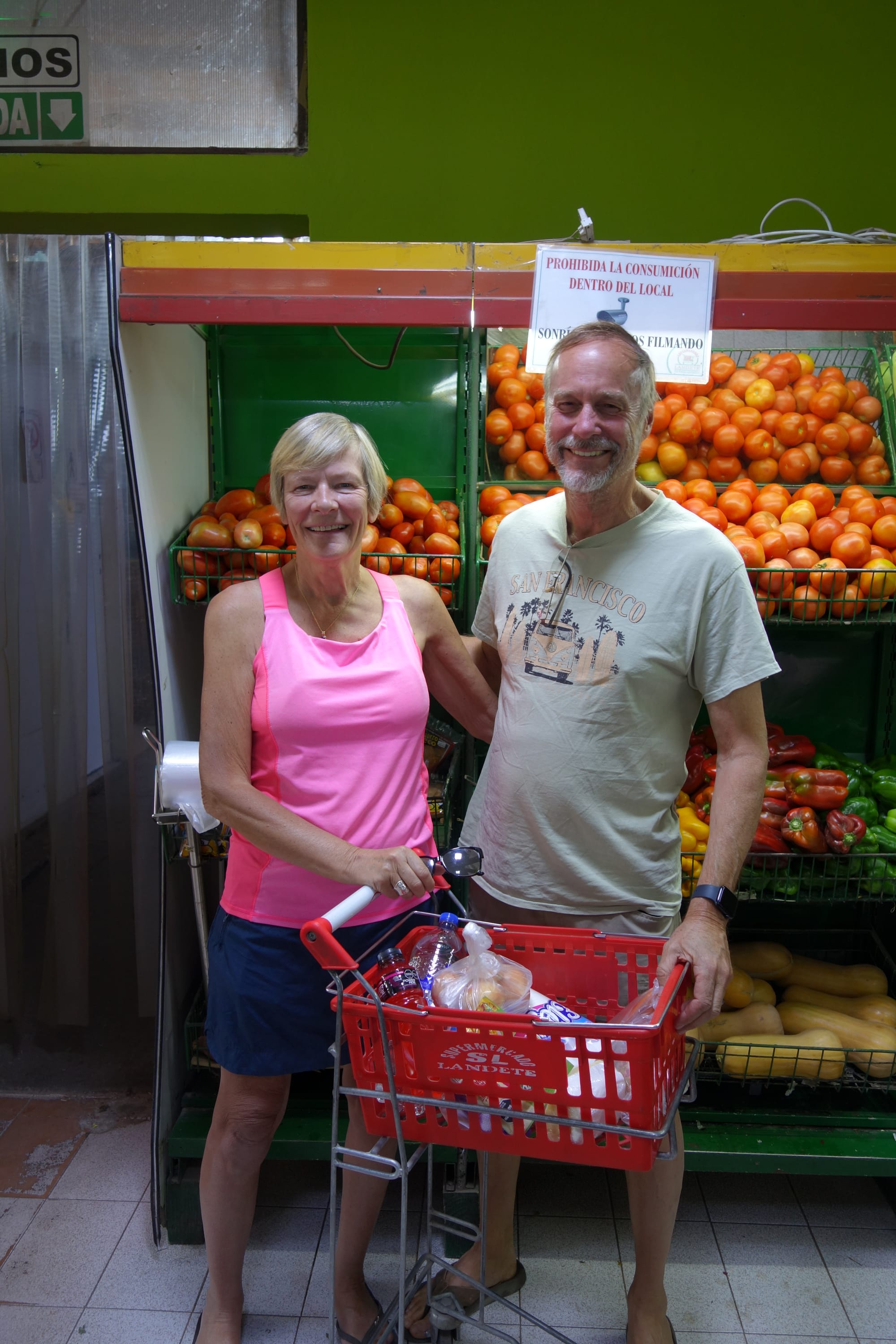
Having arrived in Mendoza I could all too easily have fallen in with the “gringo trail” backpacking crew, renting bikes and touring vineyards, dining in and out on asado and… actually I don’t know of anything else that goes on in/around that city which is probably why I did message Franco. That and that I also appreciated the total randomness of his offer and wanted to check out what may result. And it began with his inviting me to his son’s birthday. Sadly I had to decline that because I’d booked in a catch-up with Pablo and crew. Pablo? Who’s Pablo? Hold on, we’ll reach back to that story in due course.
It turned out that Franco has a finca — a farm — south of the city where he and his family live. Primarily they cultivate grapes that they sell to one of the big winemakers. It just so happened to be the time of the cosecha. So his next offer was to come and experience this harvest first hand. A good friend of mine from university, Gabriel, was always keen on heading over to France to slave a summer away picking grapes for pittance and yet he and I never did manage our viticultured pilgrimage. Here was my chance. I wasn’t entirely sure to what I was agreeing, but I had an address and I had means of transport and it would dovetail beautifully between my time in the city and a stint pulling weeds in el Valle de Uco below Volcán Tupungato.
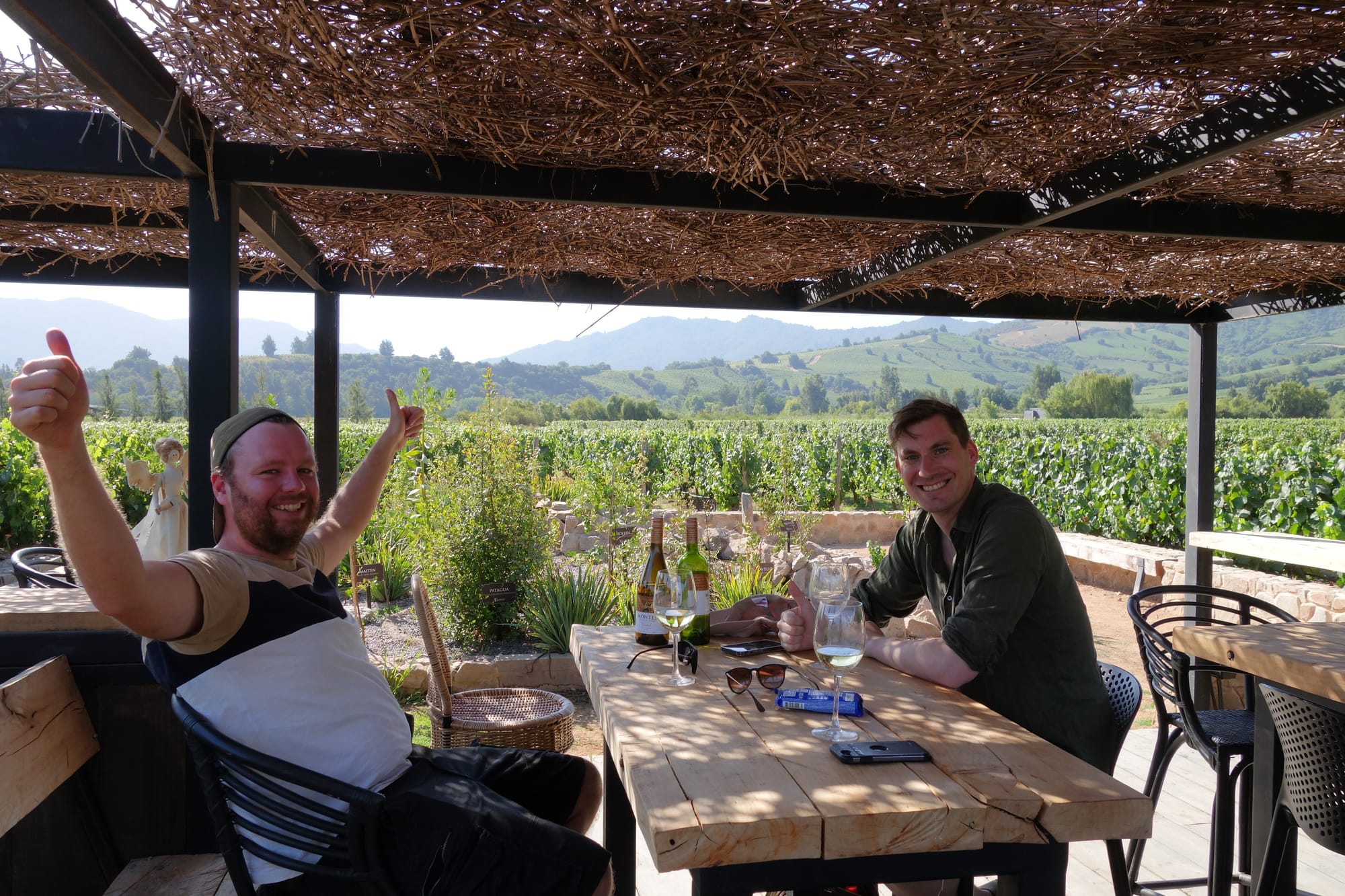
Rolling to a stop at the gated end of a dirt road I was a little nervous about what lay ahead. First the dogs and then the seasoned grape-picking pros did little to ease my fluttery jitters. One university summer I spent a month erecting and dismantling marquees: a Sisyphean contest measured in steel beams, at least one of the guys had served time and was proud about it. Dressed in cycling Lycra shorts (and jersey — I’ve since ditched them tight-fitting things for loose tees) you could say I felt a little self-conscious in similar fashion to how I felt unwrapping homemade sarnies or last night’s leftovers whilst the marquee men dug into Tesco meal deals. I scooted on, putting Franco’s house between me and the pros and their lair.
Whilst Mendoza rests just off the edge of the Andes at the point where they’ve rumpled to their zenith, from thereon out, barring some ripples around Córdoba, the land is pancake-flat to the Atlantic and this had been made fully known to me once I’d escaped the last reaches of the urban sprawl crossing the wide and wholly dry Rio Mendoza just south of Lujan de Cuyo. Water is Mendoza’s gold. Rise early, work hard, strike a spring. Vines look starved and shrivelled but sure as heck do grapes require H2O. The area has historically survived and thrived off an impressive irrigation infrastructure fed largely by snow and glacial melt from the mountains: I leave you to write the next line. For now wine is still being produced in vast quantities in the oases around Mendoza city and in the Uco Valley, even if young Argentines are turning more and more to craft beer whilst the country’s economic situation is unkind on exportation.
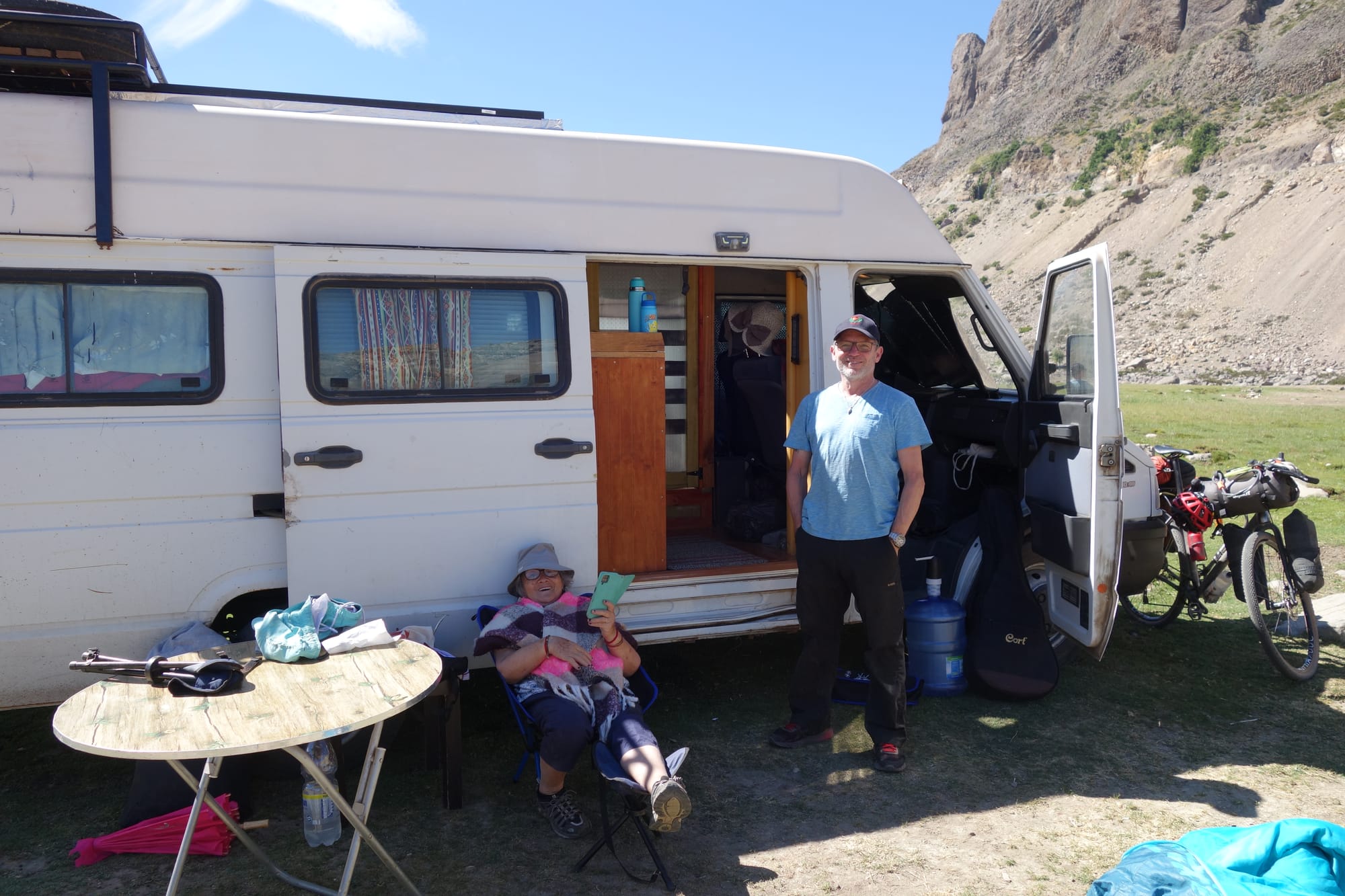
When Franco shows he confirms that I’ll be camping on their lawn bordered by vines on two sides, the bungalow home on a third and fig trees ripe with fruit lining the Andes-facing fence line. Actually on the opposite side the vines are separated from the lawn by a pool-blue painted rectangular reservoir that the lawn banks up to as it sits partially sunk, partially raised. At the southern end of this tank, the far side versus the house, is a small windowless building or what could be mistaken for a pump house. There are two doors set into its vine-facing wall. Franco knocks a courteous rap on the left door. There is no response and he informs me there are two women staying in there whilst he opens the right door to reveal my baño with a hosepipe cold shower. I hadn’t known what to expect but considering just a week before he’d invited me to his son’s birthday I will be honest and say that crashing a worker’s cell block shower was ummm unexpected. Luckily I’d thought to bring dinner and breakfast to cover all outcomes, so there I was cooking up the umpteenth basic bitch pasta dinner whilst in the distance a storm cloud punctuated the otherwise clear evening sky and let loose volleys of thunderbolts as the sun set creating a natural light show to rival any artificial Chinese equivalent. I turned in early with my basket and the electronic tag ready for the morning’s count.
It was certainly an authentic experience and I was glad for it. Franco had offered ways out. Did I simply want to observe a little or maybe just try the morning? Aside from perhaps an unfortunately timed shower depriving me of joining the crew sitdown pay show run by Maria Ester, everything was as if I were there for the season. The labourers travel down from the northernmost Argentine provinces for the cosecha and they’d been super friendly and helpful as I’d sluggishly snipped bloated bunches of grapes from the overhead vines, spraying sticky juice into my eyes and over my white tee whenever I lazily slashed through them to speed my load. One pro even bungled bunches into my basket at times, taking pity on my poor takings. They’d rush back and forth over the furrowed earth, their smaller frames avoiding collisions with the vines and wiring inches from scalping themselves. Unload, tap, sprint back. Three hours flew by. Lunch. What felt like a clandestine operation, Franco quietly tells me lunch will appear. And after a rinse of my basket and shirt in the pool, having followed the lead of the others, Franco brings a full plate out to me on the lawn with a large tinnie. Life is looking up. Post feed I lie for a vague snooze on a log mimicking the siesta of a labourer lying on the lawn, shaded by a tree, eyes covered with his washed tee.
The late afternoon stint is a symmetrical 3 hour rushathon. The camaderie appears strengthened, none more so than in its dying minutes when the fast work for the slow, forgoing their own treasure for the collective. A handicapped 9,000 ARS (£6) my takings. I was better at marquees.
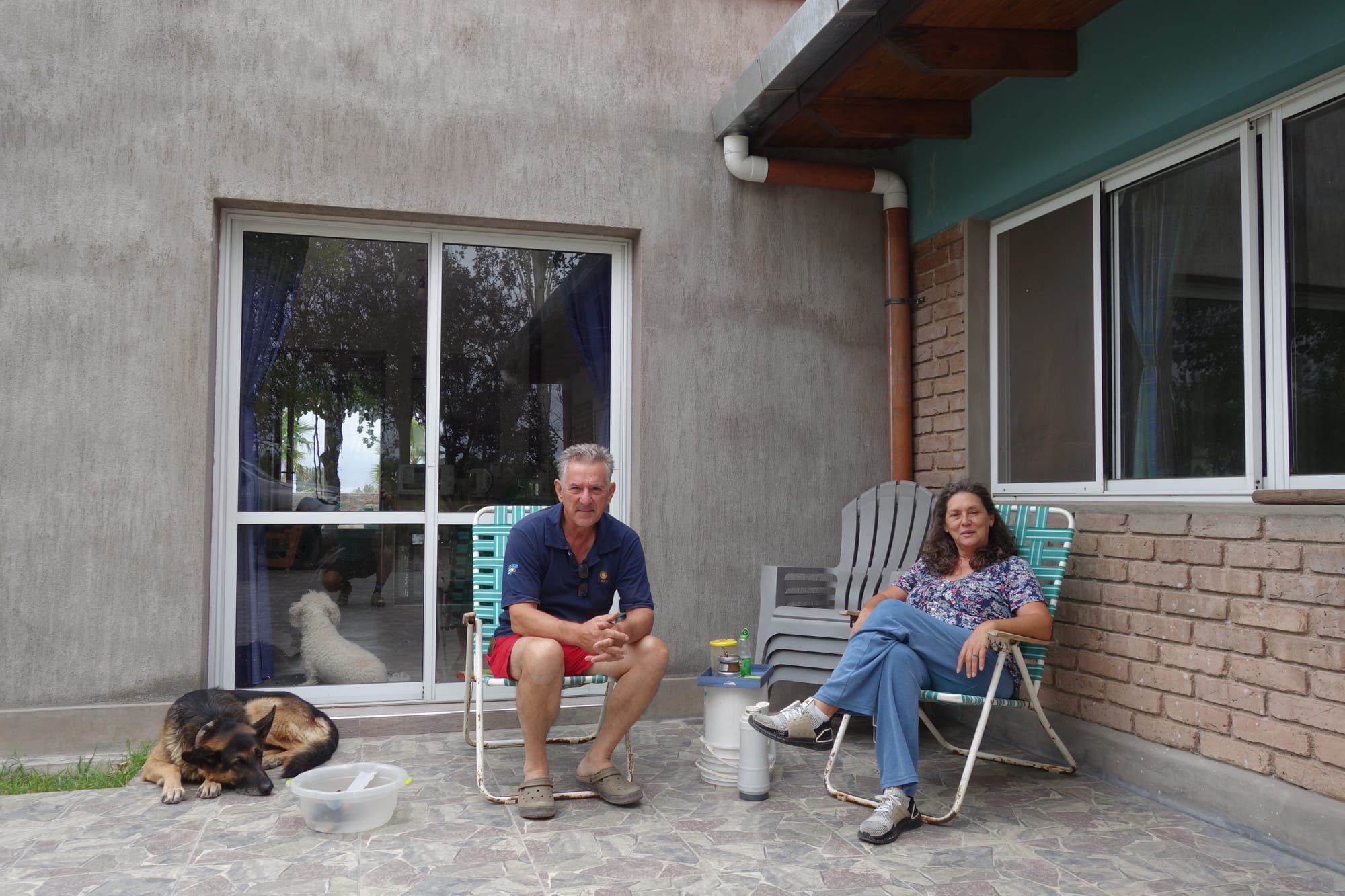
The relief — the gratitude — is big when Franco asks with a wink if I like asado. It’s been one of the journey’s big highlights sitting around that fire with Franco enjoying a cold one whilst he slow-cooked a side of beef as the Argentines do so well, moving inside to pair dinner with a bottle of red that their daughter had made. Despite my conscience-curdling truth distortion as I stuck to my “I’m from Scotland” anti-English sentiment avoidance tactic, it was a serene, calm, wholly enjoyable and desirably repeatable evening.
To come clean, Franco, I’m sorry to you and Maria Ester for accepting your hospitality and repaying with white lies. Now you know the truth. My father is English, born and raised in the Midlands. My mother was born in Glasgow and raised in Perthshire by a Scottish father and Swiss-English mother: the home I showed you is theirs (my uncle now lives in the main house). And for the most part I would call home South Wales, just outside Abergavenny, though I was born in London and passed early years in Bangkok before becoming a child of the archaic British boarding school system from 8 to 18, and that South Wales home is no more. I feel no particular allegiance to any of the individual nations that constitute the United Kingdom. But I do have an allegiance to the whole. I am British. Even if I do primarily support Scotland in the 6 Nations rugby championship.
to be continued